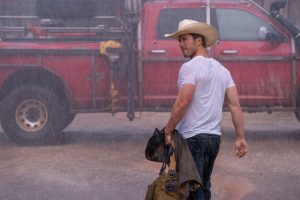Reviews include Deadpool & Wolverine, Doubles, and Mountain Queen: The Summits of Lhakpa Sherpa.
TFCA Friday: Week of April 8
April 8, 2022

Welcome to TFCA Friday, a weekly round-up of film reviews and articles by TFCA members.
In Release this Week!
Agent Game (dir. Grant S. Johnson)
“The film Agent Game ends up a film as dispensable as its agents,” sighs Gilbert Seah at Afro Toronto.
Alaskan Nets (dir. Jeff Harasimowicz)
“Unfortunately, the level of emotional connection Harasimowicz shoots for falls short of hitting the rim. One does not get to know the players well enough to truly invest in their herculean ascent up the championship mountain,” says Courtney Small at That Shelf. “While the film conveys the healing power that basketball has over the people of Metlakatla, one craves more context to life in the community off the court and the various wounds that scarred them in the first place.”
“While there is a lot going on here and Alaskan Nets navigates tones, storylines, and characters somewhat chaotically, it has a lot of heart,” writes Patrick Mullen at POV Magazine. “This aspires to be to documentary what films like The Grizzlies or Friday Night Lights are to drama.”
All the Old Knives (dir. Janus Metz)
In a combo review with The Contractor (out April 29) at The Globe and Mail, Barry Hertz endures a Chris Pine combo and wonders if (Prime) Video killed the movie star. “[A]n at-home double bill of All the Old Knives and The Contractor will do two things for you: provide a resolutely mediocre evening of distraction that will vacate your mind as soon as you go to sleep, and make you feel pretty bad about Chris Pine’s career,” laments Hertz. “Even the Wonder Woman films allowed Pine to proudly, cheekily take on the sidekick role.”
“It packs a wallop,” notes Anne Brodie at What She Said. “Pine and Newton present their characters bridging several time periods, united by their connection and secrets. A tough proposition well directed by Janus Metz. Whew.”
Ambulance (dir. Michael Bay)
“Huge numbers of cars (mostly driven by cops) are transformed into piles of burning scrap. After 15 years of Transformers, Revenge of the Fallen, Dark of the Moon, Age of Extinction and The Last Knight, I’m going to count this as progress for Bay,” writes Chris Knight at the National Post.
“If contemporary action cinema has left you bored, restless or exhausted – hello, Marvel Cinematic Universe and whatever non-Bay product Netflix is pushing this week – then Ambulance is here to remind you of the head-spinning delights of watching a genuine cinematic madman at work,” raves Barry Hertz at The Globe and Mail. “This is eye-popping, ear-splitting, guffaw-inducing stuff that makes Red Notice look like the dumpster juice it truly is.”
“With DNA largely spliced from the movie Speed, it’s a carnage-filled action film that is essentially a single extended car chase. Ambulance is a movie that is nothing if not focused,” admits Jim Slotek at Original Cin. “And okay, it’s nearly two-and-a-half hours long. I’m convinced Michael Bay couldn’t direct you to the nearest Trader Joe’s in less than two-and-a-half hours.”
“Action-wise, Ambulance succeeds, never mind the poor chemistry of the actors, the overladen plot containing too many characters, the inane dialogue not to mention its running time of over two hours,” advises Gilbert Seah at Afro Toronto.
As They Made Us (dir. Mayim Balik)
“Mayim Bialik’s feature debut which she wrote and directs is a penetrating story of a family trying to keep things together during a time of crisis,” observes Anne Brodie at What She Said. “It is tough viewing, but beautifully written, directed, and acted and a win for Bialik. You’ll never look at Bergen the same way again.”
“As They Made Us gets some stuff right. Hoffman, no surprise, vividly captures the sadness, frustration, and humiliation of inhabiting a body that refuses to work the way it used to, and his death-bed scenes are powerful,” writes Kim Hughes at Original Cin. “Agron and Helberg also bring committed performances as siblings torn between filial obligation and a desperate need for independence though their relationship never rises above cookie-cutter level.”
Cow (dir. Andrea Arnold)
“And so fine words will be spilled like so much milk, and those churlish like this writer will sullenly, solipsistically contend that too much methane stench is being emitted in the form of plaudits for this pile of poop” moos Jason Gorber at POV Magazine. “The film may have elicited a crisis of conscience, but it may have more to do with the minutes of my life I will not get back having to confront the epic emptiness of the udderly terrible Cow.”
“Of course, a film about a cow — a symbol of maternity, serenity, and fertility — is not just the story of one cow. The film is also an indictment of the factory farm system, a poetic meditation on our relationship to other species consciousness and is even a kind of crypto feminist film,” observes Liam Lacey at Original Cin. “Implicit here is the anthropological argument that the patriarchy, and gender inequality, were born with the agricultural revolution when we started putting animals in pens. Dairy cows, who provide us with the comforts of milk, butter, cheese and ice-cream, are our enduring feminine servants.”
“Arnold eschews narration, leaving the questions and their answers for viewers to formulate themselves,” notes Chris Knight at the National Post. “Cow is an unsentimental, unromanticized portrait of an animal we breed, use and dispose of in huge numbers. But it may nonetheless awake feelings in its human audience.”
Inconvenient Indian (dir. Michelle Latimer 🇨🇦)
“Visually poetic and narratively engaging – each of Latimer’s subjects feels worthy of their own stand-alone film – Inconvenient Indian dissects centuries of history and incalculable amounts of pain to present an engaging, demanding and rewarding cultural portrait,” says Barry Hertz at The Globe and Mail.
“It looks at the way truth is reimagined as a legend, for instance the myth of bloodthirsty Indians as a danger to settlers, as well as colonial heritage prisons and high prison rates among indigenous people, foster care, child theft, and residential schools, and multi-generational traumas, as it revives the Dead Indian ‘thing,’” notes Anne Brodie at What She Said. “It’s incredibly moving, seeing the pain colonials have imposed for hundreds of years.”
Islands (dir. Martin Edralin; Apr. 12 🇨🇦)
“[A] quietly charming indie film that delivers a message in a quiet and quaint way,” notes Gilbert Seah at Afro Toronto. “And often, messages are best conveyed in this manner.”
Jane by Charlotte (dir. Charlotte Gainsbourg)
At The Globe and Mail, Johanna Schneller speaks with Charlotte Gainsbourg about documenting her mother, Jane Birkin, and how the process shaped their relationship: “Birkin’s biggest revelation happened after the film, during one of the pair’s joint interviews. ‘Jane said, ‘It’s only when I saw the film that I understood I meant something for Charlotte,’’ Gainsbourg says, wonder audible in her voice. ‘During all these years, she’d had doubt. She thought I adored my father, because I put him on a pedestal, because I lost him when I was young. I know now I didn’t show her enough. So maybe one purpose of this film was to make a proper love declaration.’”
Marlene (dir. Wendy Hill-Tout 🇨🇦)
“The story of the supportive spouse is usually relegated to the background in movies such as these, which makes Marlene a welcome departure from the norm,” observes Peter Howell at the Toronto Star. “Booth portrays Marlene as a character in constant motion, smoking cigarette after cigarette and staying up late at night as she plows through 20,000 pages of documents, searching for fresh evidence that might prompt Steven’s case to be reopened despite opposition from the legal establishment.”
“Director and co-writer Wendy Hill-Tout’s Marlene is a straightforward telling of the tale that focuses on Marlene Truscott, Steven’s wife and a long-time crusader in defence of his innocence. She’s played (depending on her age) by Julia Sarah Stone and Kristin Booth,” writes Chris Knight at the National Post. “I wish I’d loved Marlene – I was certainly educated by it. But the film tends to overplay its emotional hand, whether through Janal Bechthold’s overpowering (and, to its credit, Canadian Screen Award nominated) score or a tendency for the characters to dramatize their every feeling.”
Minamata (dir. Andrew Levitas)
“A breathtaking reflection on systemic, murderous corporate cruelty and the brave late-life energy of the man who let the world know,” says Anne Brodie at What She Said. “Filled with incredibly tender moments.”
“Minamata achieves its goal of exposing Cisso’s crime of mercury poisoning – a story that needs to be told,” writes Gilbert Seah at Afro Toronto. “The film deserves to be seen for this reason.”
“[Gene] continues to booze and engage in long one-sided conversations, including drunken phone conversations with his editor. Depp is fine in an uncharacteristically reserved role, doing his best acting in the last decade,” argues Liam Lacey at Original Cin. “Yet the film’s fascination with Gene, either his adventures or his demons, seems somewhat beside the point in a story where dozens of Japanese activists are fighting for their lives and those of their dying children.”
“Minamata is filled with characters and incidents that should keep you engaged. The environmental theme is played out with clarity as is the Minamata disease,” writes Marc Glassman at Classica FM. “And Depp is persuasive as Smith. But the film feels overly melodramatic and old fashioned.”
Mothering Sunday (dir. Eva Husson)
“From the lush green English countryside to the magnificent country houses to the interior decorations, props (vintage cars, vintage telephones) and polished dialogue, there is much to observe and celebrate in being English despite the characters living in absolutely strict conditions, forced to adhere to the social mores of the times,” observes Gilbert Seah at Afro Toronto.
“Great sadness permeates the film, not just the repression of the era and certain expectations of people in certain classes, but a visceral, mournful,” writes Anne Brodie at What She Said.
“This film captures the sense of wistfulness and loss that followed the First World War – 1924 was still a little too early for people to be fretting over the Second – but it fails to burn as hot or bright on the romantic front as it seems to be trying to do,” admits Chris Knight at the National Post.
Night Blooms (dir. Stephanie Joline 🇨🇦)
At Afro Toronto, Gilbert Seah says the film “showcases a lot of fresh talent. Both writer/director Joline and her young star Clement shine and it will be an eager wait for their talent to bloom.”
Rise of the Foot Soldiers: Origins (dir. Nick Nevern; Apr. 12)
“[T]ells the gangster story in an effective straightforward chronological order (which some critics, I am certain, might complain as uninspired), easy to follow, reminiscent of gangster/hooligan films like The Long Good Friday, Lock Stock and Two Smoking Barrels, Snatch, and The Football Club,” notes Gilbert Seah at Afro Toronto.
Sonic the Hedgehog 2 (dir. Jeff Fowler)
“Sonic 2 is full of video game Easter eggs and the usual run of pop-culture references, including an odd, jokey repetition of a presidential remark first uttered after the 2017 Charlottetown rally that seemed in poor taste,” notes Chris Knight at the National Post. “But for the most part the mood is goofy fun that never gets too dark or frightening for either the under-10s or the film’s other target demo, nostalgic millennials. Even with its long runtime it struck me as a step up from the original.”
Sundown (dir. Michel Franco)
“Gleaming pools and sweating beers notwithstanding, this is Mexico, so brutal gun violence marks two climactic scenes in Sundown, one with grave consequences for Neil and his family, before the film veers left, introducing unexpected action as crises are confronted,” writes Kim Hughes at Original Cin. “Sundown dissolves with a conclusion that doubles down on the narrative uncertainty cultivated to that point.”
“Multiple twists raise Sundown’s shock value in what is essentially a character study of a man at the end of his tether; it’s heady and unsettling, and challenging,” notes Anne Brodie at What She Said.
“Mexican writer/director Michel Franco isn’t giving us much to go on,” admits Chris Knight at the National Post. “Roth’s character is certainly detached, but he’s capable of carrying on a simple conversation if required. Given that the director has a fascination with class – his last film, 2020’s New Order, was about a coup that took place during a wealthy family’s wedding – you might want to view Sundown through a Marxist lens. But there’s also some reference to medical bills that might mean something.”
“Franco sells his story with just the right amount of malice, while Roth (who reunites here with his Chronic director) manages to find a peculiar amount of pain in a man sleepwalking through life,” notes Barry Hertz at The Globe and Mail. “It might be the best work of the actor’s long career – or at least the most carefully controlled.”
¡Viva Maestro! (dir. Theodore Braun)
“In ¡Viva Maestro!, Ted Braun’s celebratory doc, the audience will be enmeshed in the glory that is Dudamel: his accessible demeanour, passion and charisma is on display constantly,” notes Marc Glassman at Classical FM. “If there’s a personal Dudamel, we never know about it; in fact, we rarely see his second wife, Maria, or Martin, his son from his first marriage.”
Canadiana: The Stars of the Screens!
At NOW Toronto, Radheyan Simonpillai, Norm Wilner, and Glenn Sumi list Canada’s Rising Screen Stars. On the list? Paulina Alexis, Amanda Parris, Alex Mallari, Jr., Amanda Cordner, Miryam Charles, and Thyrone Tommy and Thomas Antony Olajide. Here’s Glenn Sumi on the latter duo: “Sometimes in film there’s a perfect marriage between director and star. The director finds an actor who fully embodies their vision, while the actor intuitively understands what’s needed – and gives even more. Think Scorsese and De Niro, Spielberg and Hanks. Director Thyrone Tommy and actor Thomas Antony Olajide share the kind of filmic chemistry that marks great onscreen collaborations.”
At The Globe and Mail, Johanna Schneller highlights Emmanuel Kabongo as a rising star to watch: “He worked at a daycare, Foot Locker, the CNE. He did the night shift at an UP train station, vacuuming floors and cleaning toilets. ‘I used to sing to myself at work, church songs from South Africa,’ Kabongo says. ‘One night, I’m mopping, I’m singing, I’m in tears, ‘Why am I doing this?’ I heard a voice: ‘To keep you humble.’ As an actor, I need to stay humble. I have to serve the role, the work, the story. You’re never above the story.’”
At The Globe and Mail, Barry Hertz picks the 22 most influential individuals, pairs, and teams among the Canadian film scene. Atop the list is TIFF CEO Cameron Bailey and newly promoted director of festival programming, Robyn Citizen: “Together, Bailey and Citizen are charged with not only bringing TIFF back to its larger-scale, necessarily extravagant self, but with ensuring that Canadian cinema receives the international platform that our artists deserve,” writes Hertz. There’s also an honorary sort-of mention for this group—we may be discordant, we may be messy, but we throw a great party!
Also at The Globe and Mail, Hertz speaks with the Canadian Academy’s Beth Jansen (also on the list) about this year’s Canadian Screen Awards. Many of the films or TV shows may be unfamiliar to audiences, but Jansen says many films give reason why they should tune in: “I can’t imagine a Wildhood or a Scarborough or a Night Raiders coming from anywhere else,” Jansen tells Hertz. “I genuinely think that Canadian film is in a very exciting time, and sometimes when I say that I feel I’m speaking into the void because I don’t feel that these movies are getting the respect that they deserve.”
At Cinema Scope, Adam Nayman chats with Ashley McKenzie about her new film Queens of the Qing Dynasty, art that imitates life, and cheap Canadian filmmaking. “I want to say that these two separate realities ultimately worked in tandem with one another,” McKenzie tells Nayman. “This project is my most ambitious in scope to date, and it required a vast amount of my energy for long periods of time. One of the things that kept me going and feeling positive was my love for Star and An, and my affection for the people and relationships that inspired them as characters. They motivated me a lot, as collaborators, and were so on-board and enthused by it all that compartmentalizing wasn’t necessary. My contact with them reminded me every day why I was inspired in the first place.”
At POV Magazine, Patrick Mullen remembers late director John Zaritsky, who passed away last week at the age of 79. “Zaritsky was one of only three Canadians to win an Oscar for Best Documentary Feature category for a Canadian film. He won the 1982 Oscar for Just Another Missing Kid,” writes Mullen. “A personable filmmaker who spoke passionately and eloquently about not only his craft, Zaritsky understood the importance of ethical, empathetic filmmaking, not only for his subjects but also for the viewers in the room who might identify with their stories.”
Murder Mysteries: Agatha Christie and Adam McKay
At What She Said, Anne Brodie detects some fun with the Agatha Christie mystery Why Didn’t They Ask Evans? “The witty and supple script is a gem, the tone lighthearted and sunny, despite the subject matter, the settings and period costumes top-notch, in all, a nice wee get away from reality,” Brodie writes.
At Cinema Scope, Angelo Muredda dives into the love-it-or-hate-it hamfistedness of Adam McKay, and wonders why, how, and if the director’s evolved in his journey from crass buddy comedies to political satire. (Or “satire,” depending on the reader.) “With his apocalyptic climate change dramedy Don’t Look Up, McKay has sanded down his satirical teeth to about as flat as they’ll go, in an effort to appeal to as broad a coalition of normie liberal audiences as an ornery film can hope for,” writes Muredda. “A self-satisfied jeremiad about a nation and a species lowering its standards to the point where it can only process acting on extinction-grade events at the level of taglines and slogans, Don’t Look Up is the work of an artist-agitator in a holding pattern, stuck in the transition from smart comedies about dumb people to insecure, self-flattering, and ultimately scattershot commentary.”



